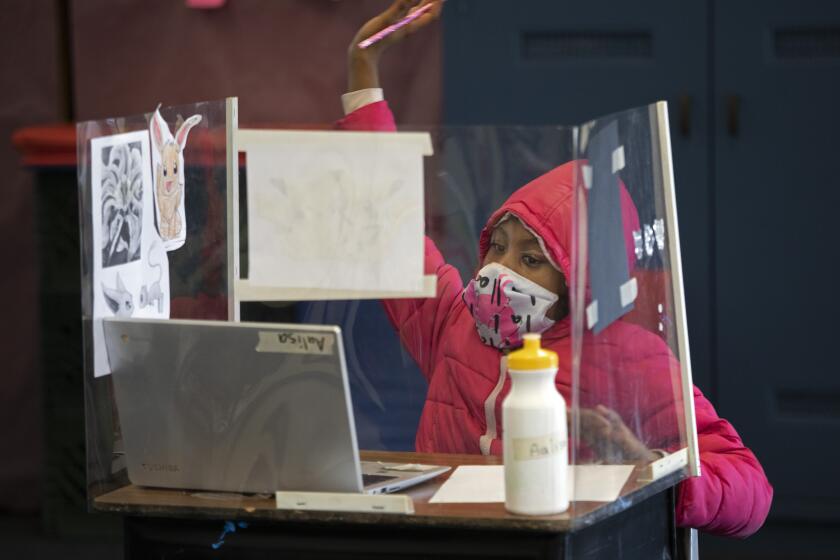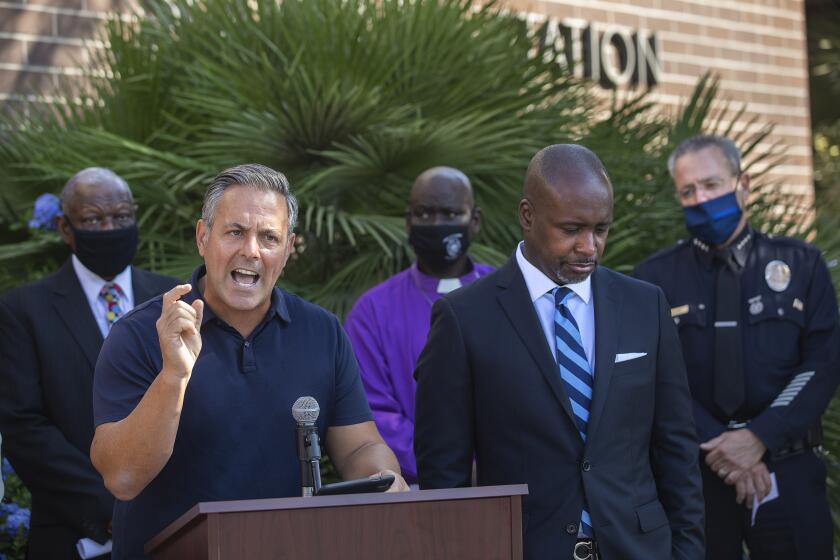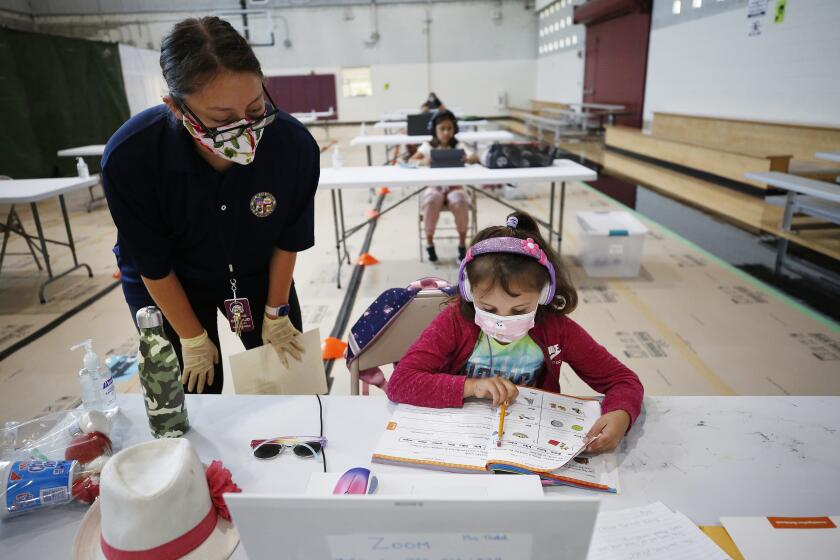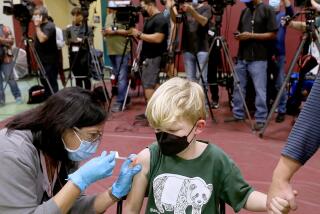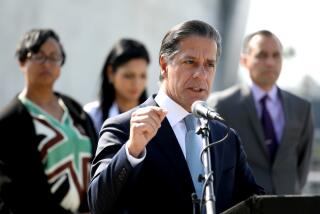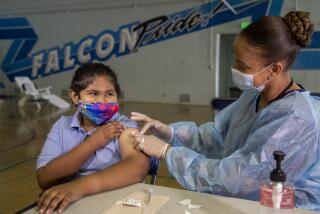Possible deal over teacher vaccines could bring elementary students back to class
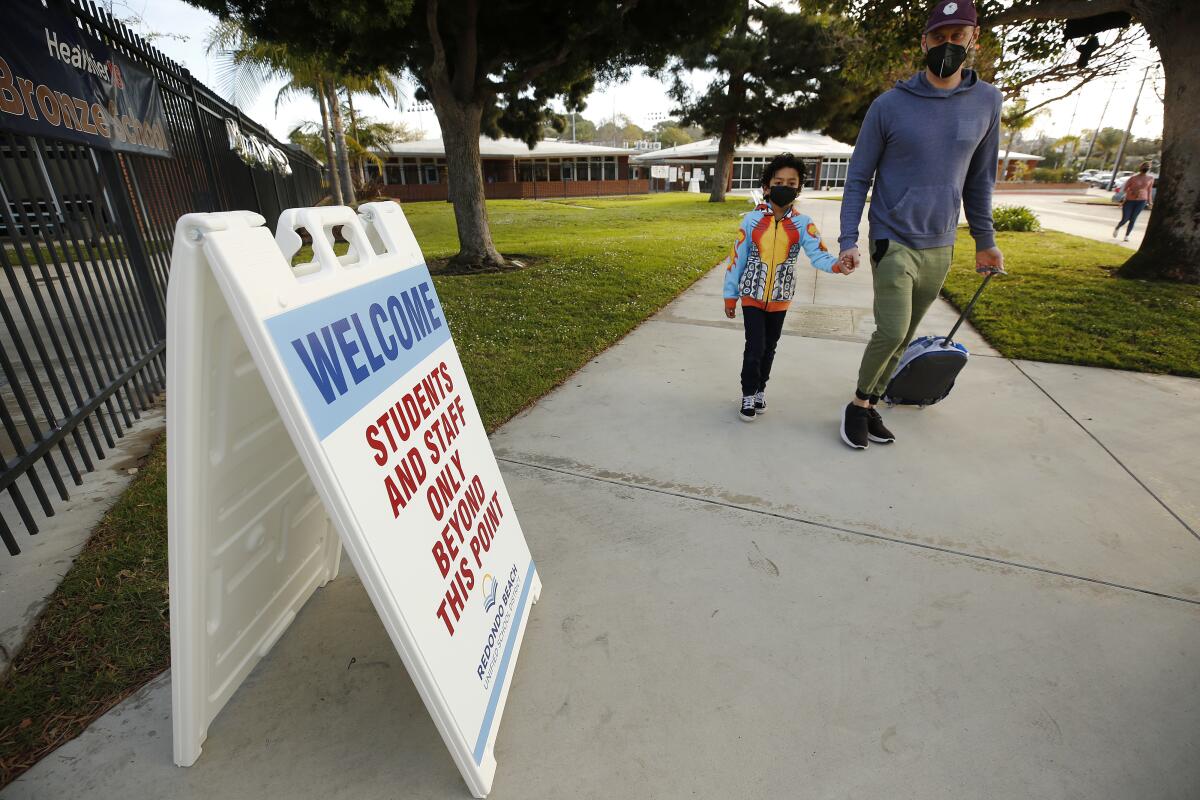
- Share via
More California elementary school students could begin returning to their classrooms by the spring if Gov. Gavin Newsom and lawmakers settle their differences over when teachers and staff receive COVID-19 vaccinations, an agreement the governor suggested Monday could be reached in the next few days.
The moves in Sacramento come as school officials and political leaders face increasing pressure to reopen campuses that have been largely shuttered for 11 months, with political jousting breaking out in recent days in Los Angeles and San Francisco.
It’s becoming clear, however, that even a gradual reopening of campuses will be directly tied to a contentious issue: Should educators get a guaranteed place in line for COVID-19 vaccinations when there are not nearly enough doses to go around?
Los Angeles school chief Austin Beutner leveled his own political salvo on the vaccine issue Monday, saying that if he got 25,000 COVID-19 vaccinations he could reopen elementary schools for a quarter-million children as soon as overall health conditions in the county permit.
Pressed with an acute vaccine shortage, county health officials responded that they would not supply them — at least not for a few weeks.
Newsom acknowledged Monday that his push to quickly open campuses — and curtail an academic and emotional disaster for students — will require additional measures. He said he hoped a deal between his office and the Legislature would emerge within days.
“We hope to get there this week, and we can announce some of that progress,” Newsom said about a possible deal with lawmakers. “It includes a prioritization framework to get our teachers vaccinated.”
Under existing state guidelines, school employees are eligible to receive a vaccine, but it is up to local health agencies to decide when they can make appointments. L.A. County officials are not yet permitting the vaccination of teachers unless they qualify under another category, such as those age 65 and older. In contrast, Long Beach, which has its own health department, allows for teacher vaccinations, but most teachers have had difficulty getting appointments and those vaccinated are not necessarily the ones needed most for a rapid reopening.
Citing the local option to immunize teachers, the governor insisted that teachers already have been prioritized, but “we want to clarify that further and that will be part of what we hope to announce.”
Interviews with legislative sources suggested that lawmakers at the Capitol want a deal with the governor to give teachers and school staff the opportunity to receive the vaccine in phases before they return to the classroom under a model that allows for a gradual reopening — with the youngest students possibly among the first to return.
If such a deal emerges, it would conform closely to what teacher unions have been asking for and would also please many school district leaders.
At the same time, by offering immunizations to only a limited group of educators, state officials would hope to placate advocates from outside education — who represent other groups with a strong claim for priority status.
Beutner reiterated his call for vaccines by pinning a number on it: 25,000 doses.
“There are about a quarter-million students in preschool and elementary schools throughout Los Angeles Unified,” Beutner said in his weekly broadcast. “To vaccinate all who work in these schools who are not otherwise already eligible, we would need to vaccinate about 25,000 people. You heard that right — vaccinating 25,000 people will allow us to reopen elementary school classrooms for 250,000 children and help their half-million-plus family members start on the path to recovery and allow many of them to go back to work.”
That target of 25,000 would include principals, teachers, bus drivers, custodians and librarians — school nurses already have access to vaccines.
Even though campuses in other states and parts of California have opened without access to vaccines, their availability has emerged as a sticking point. And timing is key as the school year slips away. On one hand, infection rates are rapidly falling across California — increasing the likelihood of faster reopenings. Pushing up against that is the lengthy period needed to achieve full immunity after inoculation, about five to six weeks after the first dose.
Some experts and officials have said that an in-person school year could become a lost cause if teachers don’t have the first dose in their arms by March 1.
For Newsom, the ground has shifted even since last week, when he insisted that vaccines were not essential to reopening. For evidence, he pointed to statements made that same day from President Biden and the new leader of the U.S. Centers for Disease Control and Prevention.
But Newsom already was rowing against a powerful political current in a state where teacher unions are among the most influential groups. His Dec. 30 proposal for $2 billion in grants to nudge campuses to open received a lukewarm response from legislators last month.
Education advocates also have been concerned about the long-term costs of coronavirus testing — which officials from President Biden on down tout as essential. Even though federal and state coronavirus aid has totaled in the billions of dollars, school district leaders worry that too little could remain to deal with long-term learning loss and the harms of social isolation.
Members of the state Senate and Assembly met through the weekend and beyond in “advanced conversations” over funding to reopen campuses, said sources involved in the negotiations.
Under a plan coming together in the Legislature, employees would receive vaccines before they return to in-person learning. Teacher unions also are pressing lawmakers for immediate access to vaccines for teachers already working on campus. The sources requested anonymity because they were not authorized to reveal details about discussions. Another point being considered would leave discretion over reopening to local school district officials.
Newsom has supported a phased-in reopening from the get-go, but has not supported immunizations as a precondition. The administration also wants the flexibility for districts in counties in the purple tier — the state’s rating for areas with the worst health crisis — to reopen.
Most school districts in Los Angeles County halted in-person services beginning in December and January at the urging of county health officials amid the dangerous surge in coronavirus cases.
But as of Feb. 1, with the county’s blessing, several school districts have resumed in-person instruction using previously approved waivers to serve students in transitional kindergarten through second grade. These and other districts also are taking advantage of state rules that allow bringing in up to 25% of a school’s enrollment at a given time to help students with special needs, such as those learning English or students with disabilities.
The debate over school reopenings intensifies as pediatricians call for it, city leaders in San Francisco sue for it. Newsom says vaccines for teachers can’t be a prerequisite. Teacher unions push back.
L.A. City Councilman Joe Buscaino said last week that he will ask the city to sue L.A. Unified to force a faster reopening, modeling his strategy on litigation filed last week by San Francisco against its own school system.
In San Francisco, teachers and school district leaders reached a tentative agreement over the weekend covering key details of a return to campus. The pact lays out scenarios for health conditions that have yet to be met.
For K-12 campuses to reopen, the agreement would require San Francisco to enter the red tier of the state’s coronavirus health metrics and also for returning teachers to be vaccinated, according to the California Federation of Teachers, which is affiliated with the union local. Under the red tier, the seven-day average of daily infections would be 4 to 7 cases per 100,000 residents.
A planned resolution by Los Angeles Councilman Joe Buscaino would direct the city attorney to sue the Los Angeles Unified School District to reopen campuses. He says the effort would be modeled on similar litigation in San Francisco.
The case rate in San Francisco — adjusted to allow for statewide comparison — is 12.5 per 100,000.
The tentative San Francisco deal is stricter than recently revised state guidelines, relying instead on a previous version of state rules. The current state standard for reopening elementary schools is 25 per 100,000 with no vaccines required, meaning that San Francisco Unified is eligible to fully reopen its elementary schools without further delay. The standard for seventh through 12th grades — 7 cases per 100,000 — has not been achieved.
The proposed San Francisco agreement would allow schools to reopen without teacher immunizations if the city reached the orange tier, which would be 1 to 3.9 new daily cases per 100,000 residents.
The harms of ongoing closures outweigh the safety risks of carefully managed classrooms, according to a regional pediatrics association. Some experts take a different view.
The adjusted case rate in L.A. County is 38.7 per 100,000.
Union leaders are holding to a stricter standard than that of the state — even when teachers are vaccinated — as a measure to protect the families of the students they serve, said Jeff Freitas, president of the California Federation of Teachers.
It could be many months before vaccines would be approved and available for children younger than 16.
The U.S. Centers for Disease Control and Prevention joined the Biden administration last week in reasserting that campuses could reopen without teacher vaccinations provided strict safety protocols were followed. Conclusions regarding data over school safety have been hotly debated.
More to Read
Sign up for Essential California
The most important California stories and recommendations in your inbox every morning.
You may occasionally receive promotional content from the Los Angeles Times.
